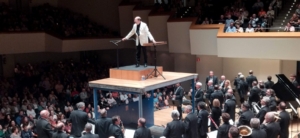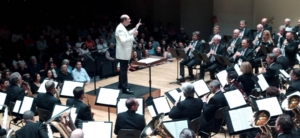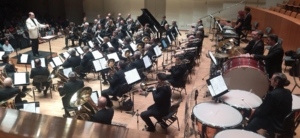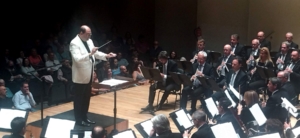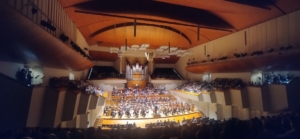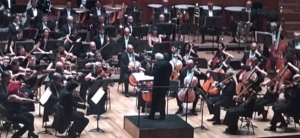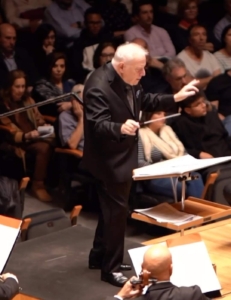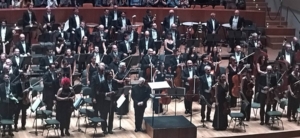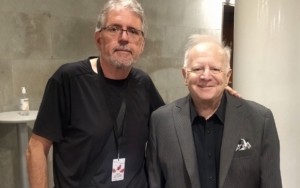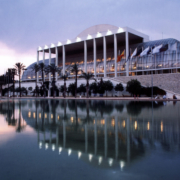Mostra de Valencia-Cinema del Mediterrani 2023 – Special Article
Our colleague Frederic Torres was present at the 38th edition of the Mostra de València-Cinema del Mediterrani, held from October 19 to 29, 2023 in Valencia (Spain), and leaves us here an extensive special article exclusively for SoundTrackFest.
NOTE: Articles from previous editions can be read here (2022 & 2021):
https://soundtrackfest.com/es/tag/mostra-de-valencia-cinema-del-mediterrani/
Article on Mostra de València-Cinema del Mediterrani Concerts, 2023
As has been customary in recent years since the Mostra was reactivated, the Symphonic Band of Valencia, prepared and performed the corresponding concert on the occasion of the celebration of the Festival with the important novelty of returning to the reopened Palau de la Música, after the rehabilitation-restoration carried out in the emblematic musical building of the city, which has occupied several years.
And it did it in a big way, on Thursday, October 26, after the meridian of the Mostra, with a concert dedicated exclusively to the great Nino Rota, led by Miquel Rodrigo i Tamarit, artistic director of the Band, who, as if it were in a surreal tribute to Fellini, was immersed in a small incident, when the podium on which the conductor was standing was raised by mistake to almost touch the ceiling to the surprise of the audience and the small scare of the conductor, in a strange circumstance that reminded to the opening sequence of La Dolce Vita, when a helicopter lifted and carried a huge statue of Jesus Christ over the skies of Rome.
After the accident, which remained as the anecdote of the night, the concert was conducted as expected, with the quality and excellence that the band imposes on their interpretations, especially in the Rota repertoire, which fit like a glove to the Band, free of strings (except for some double basses), and with large blocks of clarinets and saxophones (serving as violins, violas and cellos).
Thus, the concert began with Giulietta de los Espíritus, a piece rarely performed in the tributes dedicated to Rota and which immediately made us forget the incident suffered by Rodrigo i Tamarit, who almost immediately put all the meat on the grill with the suite dedicated to Death on the Nile, the film adaptation made in 1979, following the success of its predecessor, Murder on the Orient Express, in 1974 (with a no less excellent score by the British Richard Rodney Bennett), for which Rota composed an extraordinary and grandiose central theme, showing once again his versatility, capable of adapting to directors as particular as Fellini, but also to the demands of the big film industry.
Then, the beautiful theme of Romeo and Juliet could be heard, an exponent of the fusion of both tendencies exposed in the previous paragraph, with a commercial proposal, invested with the authorial pretensions with which Franco Zeffirelli carried out his project. One of the most remembered themes of the composer’s repertoire, which still captivates today for its inspiration and beauty. Having exposed this more commercial and well-known part of Rota, the director returned to Fellini, and after developing a generous suite from La Dolce Vita, about ten minutes long, he then undertook another suite from the classic drama Il bidone, one of Fellini’s oldest and least recognized films, starring Broderick Crawford. This was the end of the first part of the concert, in which the audience already showed their satisfaction during the intermission in the corridors of the Palau about the excellence of the performance and the acoustic quality of the restored hall.
The second part was entirely devoted to the Rota/Fellini pairing, starting with what is the quintessential Rota music, that of I Clowns, a tribute to the figure of the clown through one of Fellini’s least seen films, in which the circus roots of the Roman composer’s music are laid bare and in which they take on their maximum meaning. This was followed by an extensive symphonic suite dedicated to La Strada, with all the well-known main themes appearing in it, including that of the protagonist, Gelsomina, and in which the trumpet solo, one of the protagonists of the evening along with the clarinet, shone especially brightly. After the piece, the longest of the concert, it was the turn of the always endearing Amarcord, in which the great Italian conductor showed his childhood memories threaded with the immortal and popular melodies of his childhood and with the fantastic central theme as the main driver. The personal balance was also the protagonist of 8 1/2, but on this occasion from a more authorial perspective, in which Rota’s music acted as a counterpoint thanks to the circus-like march of the catchy “Pasarela del Adiós“, which the heated audience ended up clapping along to, driven at a frenetic pace by the director. It was the perfect end to a concert in which the expected encores did not take place, and in which the central theme of The Godfather, one of Rota’s great achievements, was missing, and which everyone thought was going to be played as a final encore.
The following day, without truce or rest, on Friday, October 27th, it was the turn of the Orquesta Municipal de València (OMV), which under the direction of Leonard Slatkin, no less, offered a superb program composed of a cinematographic first part, and a second part equally showy but detached from the specialty as it was dedicated to Ottorino Resphiggi, with two of his best known works, Fountains of Rome, and Pines of Rome.
Slatkin opened the concert with a splendid suite from The Sea Hawk, a 1940 film starring Errol Flynn, which featured a masterful score by Erich Wolfgang Korngold, an Austro-Hungarian composer born in Moravia (in Brno, now part of the Czech Republic), who came to Hollywood fleeing the conflict-ridden Europe between the wars, like more than half of the composers of the golden age of the Mecca of cinema (Steiner, Rózsa, Tiomkin, Waxman, Firedhofer), and who by then had already won a double Oscar for best score for Anthony Adverse, 1936, and the well-remembered The Adventures of Robin Hood, 1938.
This Sea Hawk featured a splendidly performed fanfare by the OMV, as canonical in terms of maritime adventure films as was Captain Blood (1935), also starring Flynn, one of the most famous pirate film scores in the history of cinema. In between, a lyrical theme of great expressiveness, played mostly on the strings, a child of the romantic period that Korngold breathed into his music, with which to describe the impossible love story between Geoffrey Thorpe (played by Flynn), and Doña Maria (Brenda Marshall), before closing the suite again with the initial fanfare, in a splendorous crescendo. Slatkin himself commented to me at the end of the concert about his own family’s ties to Korngold, his mother being a cellist on the Central European composer’s film recordings, which is why they always professed a great friendship until his death.
Perhaps not with the same boldness, but with the same dedication and aplomb, Slatkin then tackled the interpretation of Atmosphères, a piece of contemporary music by the composer György Ligeti, born in Transylvania (when the region belonged to Hungary), and of Romanian nationality, who later became an Austrian citizen as well, having lived there for most of his life. The piece, known for having been used as incidental music by Stanley Kubrick in the well-known 2001: A Space Odyssey, 1968, along with other more popular pieces such as The Blue Danube, by J. Strauss, the overture to Thus Spoke Zarathustra, by R. Strauss, and the Ballet Suite from Gayaneh, by A. Kachaturian, was brilliantly performed by the OMV, as the previous season had as one of its main leiv-motivs the celebration of Ligeti’s centenary, giving the Orchestra the opportunity to get to know first-hand the repertoire of this brilliant contemporary composer, who died in Vienna in 2006. The work, composed to be performed by a large orchestra of almost a hundred instrumentalists, strangely does not have any percussion, as pointed out in the program notes written by Joan Cerveró, accredited conductor, composer, and percussionist. Cerveró himself explains that in Ligeti’s aesthetic proposal, the micropolyphony, all the musicians are considered soloists, generating sound clouds in constant expansion in time, which are shaped and deformed in themselves, creating a unique auditory experience, which is the sensation that the music lover has after listening to any work by Ligeti.
Finally, after these two pieces, each lasting no more than ten minutes, it was the turn of the suite from On the Waterfront (1954), with music by Leonard Bernstein in his first and practically only approach to the world of cinema, by the hand of Elia Kazan, and therefore, a few years before the well-known and popular film adaptation of West Side Story, taken to the screen in 1961, although with a minimal participation of Bernstein himself. The suite of On the Waterfront began with a horn solo, with a markedly evocative accent, but also “urban”, as a kind of lament of the city (“Andante (with dignity)”), which was immediately followed by the “Presto barbaro”, with the timpani and brass as protagonist, corresponding to the virulent action of the union picket with which the narration begins. An absolutely spectacular passage that has its just correspondence in the resolution of the suite (“Allegro non troppo, molt marcato-Poco più sostenuto”), thanks to some vibrant string scherzos, mediated by the dramatic and lyrical love theme (“Andante lafgamente-More flowing-Lento”, and “Moving forward-Largamente-Andante come prima”), before reaching the brilliant and emotional final crescendo (“A tempo (Poco più sostenuto)”). An excellent score, adapted by the author himself in this suite format for programmatic inclusion in concert halls, despite having a record edition of the original recording released by the specialized label Intrada, less than a decade ago, in 2014.
In this regard, it is impossible to leave aside the subtext of the concert related to someone completely absent from the program, the American composer Alex North, who was the author in charge of the original score of 2001, and that the director, Kubrick, finally left aside in the final editing of the film, without even communicating it to the composer (who went to the New York preview to find the embarrassing evidence of the absence of his music), by substituting his work for the classical-contemporary tracklist he had in mind (proof of this is the similarity between the Overture to Thus Spoke Zarathustra and the central theme composed by North, which incorporated the same characteristic metal pyramids that immediately identify Strauss’s famous fanfare), and which ended up including the Ligeti piece cited and heard in the concert. Likewise, it is also worth mentioning North as the victimized composer On the Waterfront, although this time by choice, after having worked in the theater with Elia Kazan in 1949 in the adaptation of Death of a Salesman, the immortal play by Arthur Miller, which the same composer would musically adapt for the 1951 film version (and which earned him an Oscar nomination), and debuting on the big screen with A Streetcar Named Desire, 1951, to later work together in Viva Zapata!, 1952, obtaining nominations for the prized statuette for both scores and initiating what seemed to be one of the great cinematographic-musical binomials in the history of cinema. This collaboration was cut short after Kazan’s participation before the Committee on Un-American Activities of the ineffable Senator McCarthy, when he betrayed the membership of a number of fellow members of the Communist Party, a betrayal that North did not forgive the director, refusing to work with him again, which is why he was not present in the composition of On the Waterfront, to which he would have been appointed with total security and that finally, as we have seen, went to the hands of Leonard Bernstein, who, as has been said, did a truly memorable job. But it is a real pity, seeing Kazan’s later career, in which North could have contributed true gems of the specialty in films as conducive to his style as East of Eden (1955), Baby Doll (1956), or the excellent and celebrated Splendor in the Grass (1961).
The second part of the concert was on the side of the Italian composer Ottorino Respighi, who performed, as has been said, Fountains of Rome and Pines of Rome, two works belonging to the “Roman Cycle” of the composer, who premiered the first in 1916, and the second in 1924, to which we should add a third, Roman Festivals, from 1928, which was not included in the program. Both works reflect an orchestral intensity provided with a range of musical colors, halfway between impressionism and descriptive romanticism, and although they are not related to any cinematographic expression, they have been used in the medium (at least, in the case of “Pines”), from the avant-garde, as in the case of the filmmaker and essayist Kenneth Anger, for his short film Fireworks (1947), to familiar films such as Disney’s Fantasia 2000 (1999), in which Pines of Rome has its own space as a work recognized by the general public.
Regarding the festival itself, the official section once again reflected the desire for realistic and social cinema of previous years, with a large number of films without original music, with at most a few diegetic songs (Lost Country, Déserts, or the Portuguese Cidade Rabat, which won the Silver Palm). It is true that there were some interesting proposals, such as A House in Jerusalem and Animalia, which deal with complex conflicts from a novel point of view such as the fantastic, as in the case of the first one regarding Israelis and Palestinians (the film seems to be a cross between the Japanese The Ring (Ringu, 1998), or its American remake, The Ring (The Ring, 2002), and Sofia’s World, the novel by the Swedish Jostein Gaarder), with music by Alex Simu. Or the second, a Moroccan production (with the participation of Qatar and France) that tells the story of nothing less than an alien invasion in the North African area (and which in this case takes as references The Birds (1963), the famous Hitchcock film, and the no less classic Invasion of the Body Snatchers (1956), directed by Don Siegel). In it, its director Sofia Alaoui, takes the opportunity to delve into social differences, focusing on the situation of women, with a magnificent atmospheric music by Amin Bouhafa, who last year won the award for best music for Under the Fig Trees (Taht Alshajra, 2021), and who could perfectly have repeated this year. This was not the case, and the award went to Sharif Senhaoui for the Lebanese film Riverbed (2022), directed by Bassem Breche, which also won the Golden Palm, the highest award of the festival, as well as Best Cinematography (Nadim Saoma), in a raw story characterized above all by the duel of silences between an independent mother, who lives her life, and her wayward daughter, with whom she barely speaks, and who returns home after becoming pregnant to have her child there.
Article and pictures by Frederic Torres


